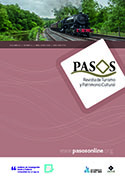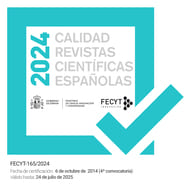Neurocommunication and sustainability: great challenges of tourism
DOI:
https://doi.org/10.25145/j.pasos.2024.22.016Keywords:
Neurocommunication, Sostenibility, Tourism, Spain, GlobaliztionAbstract
The covid-19 pandemic has driven digitalization and the need to update in various sectors to maintain their competitiveness. This study focuses on the interaction between tourism, neurocommunication and sustainability, and its influence on the image of Spain abroad. Spain is analyzed as an entity that combines economic, social, cultural and technological aspects, with a particular emphasis on tourism. Through a detailed compilation and analysis of literature in Social Sciences, Tourism, Sustainability and Neuroscience, the study seeks to understand how tourism communication affects the perception and decisions of tourists, contributing to social progress. Using specific descriptors to select academic sources, forming a corpus of data that supports the conclusions: that tourism continues to be a key economic pillar for Spain, affected by seasonality but with growth potential through sustainable marketing and communication strategies based on neurocommunicative techniques.
Downloads
Publication Facts
Reviewer profiles N/A
Author statements
- Academic society
- PASOS. Revista de Turismo y Patrimonio Cultural
- Publisher
- Instituto Universitario de Investigación Social y Turismo. Universidad de La Laguna (España) - Instituto Universitario da Maia ISMAI (Portugal)
References
Abuín-Penas, J. y Abuín-Penas, R. (2022). Redes sociales y el interés por la información oficial en tiempos de pandemia: análisis de la comunicación de los ministerios de salud europeos en Facebook durante la covid-19. Revista de Comunicación y Salud, 12, 59-76. https://doi.org/10.35669/rcys.2022.12.e303
Ahmed, M. (2023). Destination image and revisit intention: the case of tourism in Egypt. PASOS. Revista de Turismo y Patrimonio Cultural, 21(4), 681-697. https://doi.org/10.25145/j.pasos.2023.21.047
Anholt, S. (2008). Place branding: Is it marketing, or isn’t it?. Place Branding and Public Diplomacy, 4, 1-6. https://doi.org/10.1057/palgrave.pb.6000088
Anholt, S. (2010). Definitions of place branding –Working towards a resolution. Place Branding and Public Diplomacy, 6, 1-10. https://doi.org/10.1057/pb.2010.3
Barrientos-Báez, A. y Caldevilla-Domínguez, D. (2019). Relaciones públicas y neurocomunicación como herramientas de mejora de la imagen de marca de los personajes públicos. Revista de Ciencias de la Comunicación e Información, 24(1), 1-13. https://doi.org/10.35742/rcci.2019
Barrientos-Báez, A., Caldevilla-Domínguez, D., Cáceres Vizcaíno, A. y Sueia Val, E. G. (2020). Sector Turístico: Comunicación e Innovación Sostenible. Revista de Comunicación de la SEECI, 53, 153-173. https://doi.org/10.15198/seeci.2020
Barrientos-Báez, A. (2022). La neurocomunicación aplicada al aumento de la demanda turística. Human Review: International Humanities Review, 15(7), 2-11. https://doi.org/10.37467/revhuman.v11.4357
Barrientos-Báez, A. y Caldevilla-Domínguez, D. (2022). La mujer y las relaciones públicas desde un alcance neurocomunicacional. Revista Internacional de Relaciones Públicas, 12(24), 85-102. https://doi.org/10.5783/revrrpp.v12i24.791
Barrientos-Báez, A., Caldevilla-Domínguez, D. y Parra-López, E. (2022). Neuroeducación e inclusividad en el marco de la comunicación y el turismo. Fronteiras, 11(4), 288-303. https://doi.org/10.21664/2238-8869.2022v11i4.p288-303
Cabezuelo Lorenzo F. y Manfredi J. L. (2019). Posverdad, fake-news y agenda política en el discurso de Trump en Twitter. Historia y Comunicación Social, 24(2), 471-483. https://doi.org/10.5209/hics.66291
Caldevilla-Domínguez, D., Martínez-Sala, A. M. y Barrientos-Báez, A. (2021). Tourism and ICT. Bibliometric study on digital literacy in higher education. Education Sciences, 11(4), 172. https://doi.org/10.3390/educsci11040172
Casado Aranda, L. A., Rodríguez Ruibal, A., Bastidas-Manzano, A. B. y Hernández Hernández, S. (2019). Neurociencia del consumidor y turismo: una revisión de las aplicaciones de la neurociencia a las estrategias de comunicación en turismo. McGraw-Hill.
Cervi, L., Tejedor Calvo, S. y Robledo-Dioses, K. (2023). Comunicación digital y ciudad: Análisis de las páginas web de las ciudades más visitadas en el mundo en la era de la covid-19. Revista Latina de Comunicación Social, 81, 81-108. https://doi.org/10.4185/RLCS-2023-1845
Clasificación Nacional de Actividades Económicas (2023, 2 de julio). https://www.cnae.com.es/
Coello Villa, M. C. (2021). Estimulación temprana y desarrollo de habilidades del lenguaje: Neuroeducación en la educación inicial en Ecuador. Revista de Ciencias Sociales, 27(4), 309-326. https://www.redalyc.org/journal/280/28069360022/html/
Chavarría Ortiz, C., Ganga Contreras, F. A., & García Parejo, A. (2020). Responsabilidad social corporativa (RSC): impacto en pequeñas y medianas empresas Españolas. Revista Venezolana de Gerencia, 25(91), 1056-1075. https://doi.org/10.37960/rvg.v25i91.33182
Exceltur (2018). Alianza para la excelencia turística. Estudio sobre el Empleo en el Sector Turístico Español [Archivo PDF]. https://n9.cl/cimje
Exceltur (2023, 17 de julio). Alianza para la excelencia turística. Índice sintético del PIB turístico español (ISTE). https://www.exceltur.org/pib-turistico-espanol/
Florence, E. S., Fleischman, D., Mulcahy, R. y Wynder, M. (2022). Message framing effects on sustainable consumer behaviour: a systematic review and future research directions for social marketing. Journal of Social Marketing, 12(4), 623-652. https://doi.org/10.1108/JSOCM-09-2021-0221
Galindo Cáceres, J. (2007). La Comunicología y la mediación social. Dos trayectorias en diálogo. Mediaciones Sociales, 1(18) 175-194. https://perio.unlp.edu.ar/ojs/index.php/question/article/view/534
García Reinoso, N. (2019). Segmentación y valoración del mercado turístico: Estudio del destino Patrimonio de la Humanidad Trinidad de Cuba. Revista Venezolana de Gerencia, 24(87), 785-806. https://doi.org/10.37960/revista.v24i87.24637
Hartmann, R. (1986). Tourism, seasonality and social change. Leisure Studies, 5(1), 25-33. https://doi.org/10.1080/02614368600390021
Hernández-Peña, H., Lagomarsino-Montoya, M., Aguirre-Martínez, G., Mansilla Sepúlveda, J., Estay-Sepúlveda, J. G. y Ganga-Contreras, F. (2022). On the digital age from humanistic psychology. Environment and Social Psychology, 39(1), 35-53. https://doi.org/10.22544/rcps.v39i01.03
Higham, J. y Hinch, T. Tourism, sport and seasons: the challenges and potential of overcoming seasonality in the sport and tourism sectors. (2002). Tourism Management, 23, 175-185. https://doi.org/10.1016/S0261-5177(01)00046-2
Hosteltur (2023, 30 de septiembre). Las aerolíneas temen el efecto Greta. https://www.hosteltur.com/133991_las-aerolineas-temen-el-efecto-greta.html
Hosteltur (2023, 30 de septiembre). España, ¿un país de camareros?. https://www.hosteltur.com/134985_espana-pais-de-camareros.html
Jiménez-Sánchez, Á. y Vayas Ruiz, E. C. (2021). Dimensiones motivacionales en Facebook en estudiantes y trabajadores universitarios del Ecuador. Revista de Comunicación de la SEECI, 54, 43-63. https://doi.org/10.15198/seeci.2021.54.e656
López Bonilla, J. M. y López Bonilla, L. M. (2006). La concentración estacional en las regiones españolas desde una perspectiva de la oferta turística. Revista de Estudios Regionales, 77, 75-106. https://idus.us.es/handle/11441/54070
Marín Pérez, B. (2021). Streaming: ventajas, desafíos y oportunidades de las radiotelevisiones para captar audiencias. Revista de Ciencias de la Comunicación e Información, 26, 45-65. https://doi.org/10.35742/rcci.2021.26.e85
Martínez-Costa, M.-P., Amoedo-Casais, A. y Moreno-Moreno, E. (2022). The Value of Podcasts to Journalism: Analysis of Digital Native Media brands’ Offerings, Production and Publishing in Spain. Profesional de la Información, 31(5), 1-15. https://n9.cl/ph5xs
Mayoral, J., Parratt, S. y Morata, M. (2019). Desinformación, manipulación y credibilidad periodísticas: una perspectiva histórica. Historia y Comunicación Social, 24(2), 395-409. https://doi.org/10.5209/hics.66267
Mihaela Marinescu, I., Mejías Martínez, G. y Nogales-Bocio, A. I. (2022). Estrategias persuasivas y emocionales en las campañas audiovisuales de la DGT en el periodo 2011-2019. Revista de Comunicación y Salud, 12, 1-20. https://doi.org/10.35669/rcys.2022.12.e286
Montoro-Montarroso, A., Cantón-Correa, J., Rosso, P., Chulvi, B., Panizo-Lledot, A., Huertas-Tato, J., Calvo-Figueras, B., Rementeria, M. J. y Gómez-Romero, J. (2023). Fighting Disinformation With Artificial Intelligence: Fundamentals, Advances and Challenges. Profesional de la Información, 32(3). https://doi.org/10.3145/epi.2023.may.22
Monzón Troncoso, A. S., Illa-Sihuincha, G. P., Ruiz Villavicencio, R. E. y Candia Menor, M. A. (2022). Neuromanagement y responsabilidad social: factores clave en la gestión educativa universitaria. Revista de Ciencias Sociales, 28, 135-144. https://dialnet.unirioja.es/servlet/articulo?codigo=8471679
Moragas Spà, M. D. (2007). La mediación social y los enfoques de la teoría de la comunicación. Mediaciones Sociales, 1, 261-269. https://revistas.ucm.es/index.php/MESO/article/view/MESO0707110261A
Moral-Moral, M. (2021). La aplicación del neuromarketing al ámbito del turismo: una revisión bibliográfica. Vivat Academia, 154, 429-442. https://doi.org/10.15178/va.2021.154.e1359
Muñiz, D. (2001). El turismo social como tipología turística desestacionalizadora de la empresa hotelera. Cuadernos de Ciencias Económicas y Empresariales, 41, 93-110. https://dialnet.unirioja.es/servlet/articulo?codigo=768868
Naciones Unidas (1994). (Departamento de Información Económica y Social y Análisis de Políticas. División de Estadística). Recomendaciones sobre estadísticas del turismo, 6ª Ed.; Naciones Unidas. https://unstats.un.org/unsd/statcom/doc00/m83note-s.pdf
Parra-López, E., Barrientos-Báez, A. y Martínez, J. A. (2020). La transformación digital del turismo. Revista de Occidente, 464, 52-66. https://n9.cl/bxv3f
Ramón, A. B. y Abellán, M. J. (1995). Estacionalidad de la demanda turística en España. Papers de Turisme, 17, 45-73. https://formacionev.cv.uma.es/pluginfile.php/16421/course/overviewfiles/.pdf
Rivero, J. L., Hernández, J., Corral, S. y Navarro, M. (2020). Una breve reflexión desde el cero turístico. En R. H. Moisés Simancas, Turismo pos-covid-19. Reflexiones, retos y oportunidades (págs. 781-801). La Laguna: Cátedra de Turismo Caja Canarias-Ashotel de la Universidad de La Laguna. https://portalciencia.ull.es/documentos/5f18cd1a29995223b37770c8
Rodríguez Torres, J. y Gómez Jiménez, O. (2021). La atención a la diversidad durante la covid-19: revisión legislativa de las medidas según LOMCE. Vivat Academia, 154, 1-19. https://doi.org/10.15178/va.2021.154.e1241
Ruizalba, J. L., Vallespín, M. y Pérez-Aranda, J. (2015). Gestión del conocimiento y orientación al marketing interno en el desarrollo de ventajas competitivas en el sector hotelero. Investigaciones Europeas de Dirección y Economía de la Empresa, 21, 84-92. https://doi.org/10.1016/j.iedee.2014.03.001
Salvador-Mata, B., Cortiñas-Rovira, S. y Herrero-Solana, V. (2023). La investigación en periodismo y covid-19 en España: mayor impacto académico en citas, aproximaciones metodológicas clásicas e importancia temática de la desinformación. Revista Latina de Comunicación Social, 81, 554-574. https://doi.org/10.4185/rlcs-2023-2001
Statista (2023, 3 de noviembre). Porcentaje del PIB aportado por el sector turístico en España de 2010 a 2022. https://acortar.link/8XBDba
Treré, E., Candón-Mena, J. y Sola-Morales, S. (2021). Imaginarios activistas sobre Internet: Del mito tecno-utópico al desencanto digital. Cuadernos de Información y Comunicación, 26, 33-53. https://doi.org/10.5209/ciyc.76147
World Travel and Tourism Council (2023). Travel and Tourism, Economic Impact 2023 Spain. WTTC. https://wttc.org/research/economic-impact
Downloads
Published
How to Cite
Issue
Section
License
Copyright (c) 2024 Almudena Barrientos-Báez, María del Carmen Paradinas-Márquez, David Caldevilla-Domínguez

This work is licensed under a Creative Commons Attribution-NonCommercial-NoDerivatives 4.0 International License.
I confirm that the work is original (of my/our authorship), and that it will not be submitted to other journals or publications until the final resolution of the review process in PASOS, RTPC.
I authorize the publication of my work by PASOS, PSTN of free and open access in any of the formats that I deem appropriate, for an indefinite period of time and as a non-remunerated collaboration.
Likewise, the author(s) understands that the published work may be linked or deposited on any server or included in other publications (republication), provided that the new place and/or new edition references the original publication and acknowledges the authorship and copyright ownership of PASOS RTPC publications.
Authors understand that a plagiarism-self-plagiarism check will be performed, and the article may be removed at any time from the editorial flow.










